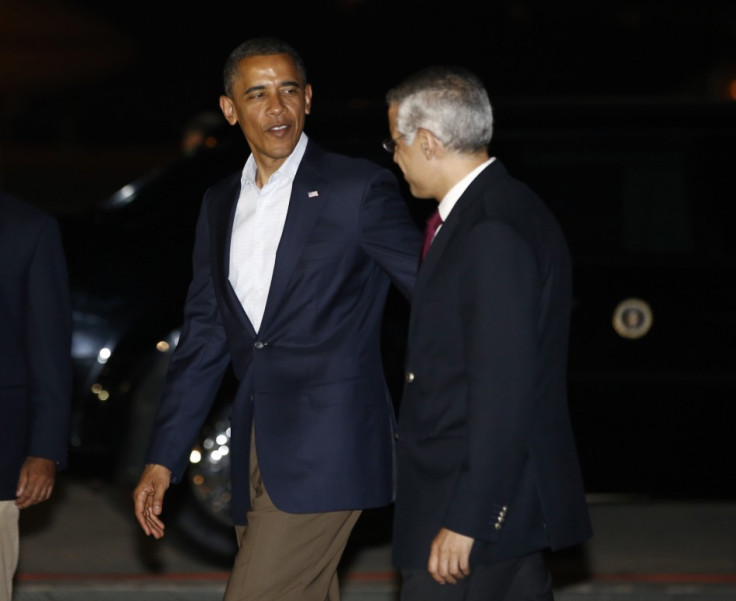G20 Draft Communique Presses for European Action on Crisis as IMF 'Firewall' Strengthened

G20 leaders are unveiling a new set of plans that will boost the International Monetary Fund's (IMF) firewall, promote economic growth and jobs, tackle the Eurozone sovereign debt crisis in the long term and therefore contain the detrimental overspill in the emerging markets, according to the group's Draft Communique.
Dubbed the "Los Cabos Action Plan", the plan outlines how the G20, which comprises around 80 percent of global economic output, will also invest in infrastructure and promote trade while sticking to its pledges to bring down budget deficits, shore up crisis funds and of course tackle the unwinding of the sovereign debt crisis for the long term.
According to a G20 source cited by Reuters, "Euro area countries have agreed to take all necessary policy measures to safeguard region's integrity and stability and the draft communique urges the Eurozone to find ways to break the 'feedback loop' between sovereign states and banks."
The unnamed source also adds that the G20 Draft communique says the "top priority for the G20 remains strong, sustainable and balanced growth that reduces unemployment."
"Europe may be able to muddle through but the risk is rising," said Robert Zoellick, president of the World Bank. "There could be a Lehman moment if things are not properly handled."
IMF's Firewall
The IMF initially set up a firewall as a crisis fund against the deepening Eurozone sovereign debt crisis and after the G20 Summit, leaders are expected to call on nations to increase existing contributions.
"I estimate that there will be a larger capitalisation than the pre-accord reached in Washington, which will be finalised here, but I don't want to speculate by how much," said Mexico's president Felipe Calderon, who is hosting the G20 summit in Los Cabos. "I hope there's a very important agreement about the IMF."
The IMF fund will be crucial to the Eurozone as it will serve to support governments that are struggling to cope with debt repayments and therefore halting the risk of a default. However, while the IMF seeks to bolster the fund to $430bn, the G20 countries will have to largely rely upon emerging nations, such as China for the extra amount.
"China is confident that the IMF will realize its $430 billion, and China will pitch in." said Chinese Vice Finance Minister Zhu Guangyao. "During this Los Cabos summit a specific amount will be announced."
Although Zhu did not reveal a set figure, he did say that he told reporters ahead of the G20 summit in the Mexican resort of Los Cabos. He was confident of raising "over $430 billion."
European leaders have previously promised $200bn, while Japan pledged $60bn; Britain, South Korea and Saudi Arabia each pledged $15bn, while the US has refused to stump up any cash, citing domestic political difficulties as the reason.
With the IMF crisis fund being bolstered by mainly the emerging markets, G20 leaders will also be expected to provide more concrete details on how they plan to tackle the deepening Eurozone crisis and therefore contain the contagion into emerging nation territories.
Zhu said that the other "Bric" countries - Brazil, Russia and India - would meet ahead of the meeting as they hope to leverage their contributions as they seek greater voting power in the western dominated fund.
"The EU has to make up its mind to untangle this problem and to address the government indebtedness, banking indebtedness, and the relation between the two," said Zhu.
"We are confident that the European countries can rely on themselves to untangle their problems."
Promoting Growth in a Time of Turmoil
The key issue that markets will be waiting for more details on, is how exactly G20 leaders are going to achieve a huge leap of financial, fiscal and political union in order to strengthen the resiliency of monetary union, in the form of a roadmap.
While some are hoping for concrete plans, some initial comments from the Summit may mean that G20 countries will have to wait longer than hoped for.
"We're going to continue to make the case," said David Plouffe, a senior Obama adviser. "There will be progress made over the next couple days, but no one should expect a firm resolution."
However, leaders have been granted some breathing space, after results from Sunday's pivotal Greek election showed parties that support Athens' European Union (EU) and IMF-led bailout terms won a parliamentary majority.
The results from the elections will mean that fears over Greece being pushed out the Euro will, at least for the short term, be dampened.
"Greek elections [are] positive, but many issues remain unsolved," say analysts at RBS. "A New Democracy-led coalition is the best outcome for Greek elections among the possible scenarios we outlined last week. The presence of a pro-EU/IMF government which is able to negotiate with the Troika reduces the tail risk of an acceleration in deposit outflows from Greek banks."
The positive election outcome also bodes well for G20 countries, as European leaders will be more willing to be flexible on austerity measures that should quell concerns over a Greek default and therefore contain the contagion across the rest of Europe.
German Foreign Minister Guido Westerwelle said that "I can imagine that we would talk about the time axes once again" but of course left no doubt that Greece must stick to the terms of the bailout if it wants to stay in the euro currency.
However, Germany hinted at its flexibility on austerity measures when it indicated a readiness to give Athens more time to implement the tough economic reforms required under its €130bn bailout.
While, this will help European G20 leaders craft a plan for the shorter term, leaders will have to deliver a strategy for the longer term.
© Copyright IBTimes 2024. All rights reserved.









